|
|
|
Sort Order |
|
|
|
Items / Page
|
|
|
|
|
|
|
| Srl | Item |
| 1 |
ID:
099611
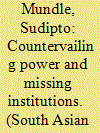

|
|
|
|
|
| Publication |
2010.
|
| Summary/Abstract |
Providing resource security for one group of stakeholders frequently entails loss of a certain degree of resource security for another group of stakeholders. The competing interests of winners and losers, and the 'public good' nature of many resource uses, makes it challenging to provide resource security in a benign and equitable manner. Power relations are key in determining compensation outcomes, and in particular the importance of countervailing power, in the absence of autonomous institutions with regulatory authority. When one group has overwhelming market power, or political power or a combination of the two, that group's interest will drive the outcome, regardless of the technical principles of compensation. The article demonstrates through examples how the dynamics of countervailing power works in the national context and in the global context. It also highlights the usefulness of autonomous institutions with jurisdiction over resource security issues. Institutions can protect the interest of stakeholders who do not have either economic power or political power.
|
|
|
|
|
|
|
|
|
|
|
|
|
|
|
|
| 2 |
ID:
099609


|
|
|
|
|
| Publication |
2010.
|
| Summary/Abstract |
There is a broad agreement in the international academic community as well as among the major political leaders in the world that burning fossil fuels is a major cause for global warming. This article focuses, first, on the linkage between energy security and climate change; second, on the responsibilities of national governments on the one hand and the responsibilities of the international community on the other hand; and third, on the importance of the role of leaders in today's globalising world, especially with respect to energy security and climate change. The hypothesis of this article is that a globalising world requires global governance. To create global governance mechanisms, we need leadership. Leadership, however, requires not only leaders but also followers, as well as an understanding of the challenges to and the opportunities for the world we are living in.
|
|
|
|
|
|
|
|
|
|
|
|
|
|
|
|
| 3 |
ID:
099618


|
|
|
|
|
| Publication |
2010.
|
| Summary/Abstract |
This article briefly outlines the food-water-energy interlinkages for sustainable development in India. It begins by underlining the emerging severe land constraint and relates it to water development strategies since water use not only raises agricultural productivity, but releases the land barrier by intensity of land use. Given this problem, energy becomes a related focus and of course, is by itself another major issue in sustainable development and long-term security. The article begins with estimates to show that India is probably urbanising faster than generally thought and together with a severe water development crisis, is in a difficult situation. It also develops the profile that a similar situation exists in the energy sector. In each problématique, the article ends with some governance issues and suggestions.
|
|
|
|
|
|
|
|
|
|
|
|
|
|
|
|
| 4 |
ID:
099610
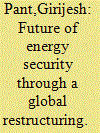

|
|
|
|
|
| Publication |
2010.
|
| Summary/Abstract |
The base and superstructure of the present energy regime are becoming unsustainable. With billions joining the energy market, supplies have to expand exponentially. The expansion of energy supplies from new sources becomes the necessary condition for global energy security. The scale of expansion required to construct a new global energy mix can only be accomplished through a global approach. It is a global question because the concerned stakeholders are located in different regions consisting of different globalising economies. Increasing integration and interdependence among the energy suppliers and consumers, and the location of the energy industry in the globalising market, has necessitated the redefinition of energy security both at the conceptual and policy level. The future of energy security has to be defined in terms of global energy systems and regime. A global restructuring of energy system would inevitably assume global engagement, global partnership and global norms and institutions.
|
|
|
|
|
|
|
|
|
|
|
|
|
|
|
|
| 5 |
ID:
099619


|
|
|
|
|
| Publication |
2010.
|
| Summary/Abstract |
The Renewable Energy Sources Act of Germany has been a success story, thanks to the advantages that derive from promoting energy from renewable sources. The way in which renewable energy sources are promoted under the Renewable Energy Sources Act is a pioneering approach that is unprecedented in Germany or any other country. However, this type of support for innovation cannot be continued indefinitely, for if the federal government's target is of obtaining 30 per cent of electricity supplies from renewable sources by 2020, this form of support must be re-examined and further developed. Renewable sources of energy are important not purely for environmental reasons but also because they contribute to energy security. Nevertheless, it is important that the supply of energy be climate friendly, environment friendly and cost effective, not only in Germany but throughout the world.
|
|
|
|
|
|
|
|
|
|
|
|
|
|
|
|
| 6 |
ID:
099617
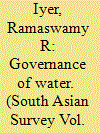

|
|
|
|
|
| Publication |
2010.
|
| Summary/Abstract |
The term 'water governance' encompasses a wide range of issues of water policy, management, sharing, rights, conflicts, social justice and equity, conservation, sustainability and so on; and almost all of them involve legal questions. This article provides a broad overview, both explanatory and prescriptive, of some of the legal issues relating to water. These will include the question of ownership of water; the relationship between the state and civil society; the doctrine of public trust; the distinction between the right to water (that is, water as life-support) and water rights (use rights such as for agriculture, industry, etc.); water-related disputes of all kinds (including river water disputes) and the principles, entitlements, relative priorities and institutional arrangements needed for avoiding or resolving them; water markets and the question of privatisation of water; the regulation of water use in the interest of equity, social justice, harmony and sustainability and so on.
|
|
|
|
|
|
|
|
|
|
|
|
|
|
|
|
| 7 |
ID:
099616
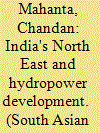

|
|
|
|
|
| Publication |
2010.
|
| Summary/Abstract |
Hydropower, while being projected as a clean and renewable energy source, has time and again been resisted vociferously in North East India in recent times because of the obvious and unintended social and environmental impacts. The anticipated negative impacts of the associated dam and reservoir construction have cast a threat to the security of the indigenous people in terms of water, food, livelihood, energy and above all, the related socio-economic concerns. This is all the more due to the uncertainties flowing from an inadequate understanding of the possible geo-environmental impacts in a highly sensitive terrain. To cope and live with the potential negative ramifications of hydropower projects, a comprehensive hydropower policy with emphasis on long-term environmental and social security and sustainability is imperative.
|
|
|
|
|
|
|
|
|
|
|
|
|
|
|
|
| 8 |
ID:
099612
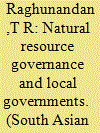

|
|
|
|
|
| Publication |
2010.
|
| Summary/Abstract |
The management of increasingly scarce natural resources is perhaps the most important governance challenge facing humanity today. The designing of appropriate systems for natural resource management by local governments is an interesting policy challenge. This has to be approached objectively and with an unwavering focus on the objective to be achieved, namely, that people require responsible natural resource management for their survival. In doing so, there should be no biases for or against decentralisation. One will have to think out of the box, particularly while designing systems for collaborative action by local governments and other stakeholders. This article analyses the challenges in fostering a sustainable governance of resources by local governments, within the context of their functional responsibilities, and suggests some policy solutions. The article concentrates on the Indian context, while suggesting features of inter-governmental design that comprise the right mix of checks and balances, which is so essential for the good governance of natural resources.
|
|
|
|
|
|
|
|
|
|
|
|
|
|
|
|
| 9 |
ID:
099608
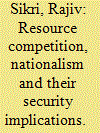

|
|
|
|
|
| Publication |
2010.
|
| Summary/Abstract |
The current global debate about resource competition and resource nationalism is frequently situated only in the context of natural resources, particularly energy sources. However, an equally keen and perhaps more vital competition is taking place over capital, labour and technology, the other key factors of production. Nonetheless, the current and looming conflicts over natural resources centre on energy sources, particularly oil. Given its location and size, its economic and military strength and potential, and its position as a growing consumer of energy, India will be very much a part of global energy geopolitics in the coming years. Since energy flows and energy projects are often key determinants of many bilateral relationships, and invariably have a regional, at times even a global, significance, India needs to give much greater and more focused attention to energy issues in its security and foreign policy perspective.
|
|
|
|
|
|
|
|
|
|
|
|
|
|
|
|
| 10 |
ID:
099615


|
|
|
|
|
| Publication |
2010.
|
| Summary/Abstract |
Genetic diversity in the field is the key to long-term sustainable food production. In agriculture and forestry, genetic diversity can enhance production in all agricultural and ecosystem zones. Genetic erosion is the loss of genetic diversity, which is being caused not just at the level of individual genes but at the level of gene combination, which is even more dangerous. The main cause of genetic erosion is varietal replacement. However, there are many traditional varieties that are extremely high yielding and that can, in fact, form a much bigger mix of varieties available in the field than this very narrow approach to increasing productivity would suggest. Genetic erosion is happening at a more rapid pace in developing countries because of the somewhat faulty planning to bring about change and increase productivity. Above all, agrobiodiversity, which is genetic diversity related to agriculture, is threatened not because of overuse but because it is not used
|
|
|
|
|
|
|
|
|
|
|
|
|
|
|
|
| 11 |
ID:
099613


|
|
|
|
|
| Publication |
2010.
|
| Summary/Abstract |
There are several technical, institutional and geopolitical challenges facing an expanded nuclear industry in the twenty-first century. This article addresses some of the security concerns that are linked to the expansion of nuclear power in the world. Given that more and more states are going to have access to sensitive nuclear technology and material, the security concerns surrounding nuclear energy are bound to increase. However, in the absence of a satisfactory nuclear waste management solution and adequate regulatory protocols, a large-scale expansion of the civil nuclear sector will present significant security challenges. The adaptation of the fuel cycle to incorporate reprocessed spent nuclear fuel presents perhaps the most serious concern owing to the inherent relationship between reprocessing and nuclear proliferation. Of equal concern is the fact that existing international regimes are inadequate to deal with civilian nuclear-related issues in the twenty-first century.
|
|
|
|
|
|
|
|
|
|
|
|
|
|
|
|
| 12 |
ID:
099614


|
|
|
|
|
| Publication |
2010.
|
| Summary/Abstract |
Uranium trade and the role it will play in India's foreign policy and national security is set to grow in the coming decades. India's interest in uranium is part of a long-term strategy to move towards a more self-sufficient and relatively carbon-free energy future. In the context of India's fast-expanding uranium trade with, and equity investments in, key uranium producing countries, the contours of the security implications of India's uranium diplomacy need to be identified. It is important to understand that the import of strategic energy resources is seldom devoid of security implications in one form or the other. Highlighting possible security implications can help strategise a uranium trade policy that is proactive, well informed and holistic in its understanding of what advantages and disadvantages uranium trade poses to the country's larger energy security. This article identifies seven possible trajectories of the security implications of India's uranium trade with the world in the coming years.
|
|
|
|
|
|
|
|
|
|
|
|
|
|
|
|
|
|
|
|
|